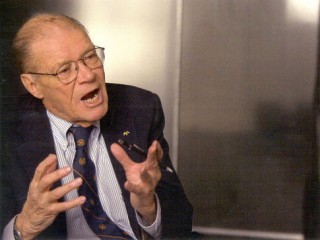
Robert McNamara biography
Date of birth : 1916-06-09
Date of death : 2006-07-06
Birthplace : San Francisco, California, U.S.
Nationality : American
Category : Politics
Last modified : 2010-06-09
Credited as : U.S. Secretary of state and defense, President John F Kennedy,
0 votes so far
Robert S McNamara (in full Robert Strange McNamara) is a former U.S. secretary of state, author, businessman. Born on June 9, 1916, in San Francisco, California. Robert S. McNamara is best known as the secretary of defense in the 1960s and as an important figure in the controversial Vietnam War. In 1937, he graduated with a degree in economics from the University of California in Berkeley. An excellent student, McNamara went to study at Harvard Business School where he earned his master's degree in 1939.
After a short stint on the West Coast, McNamara was back at Harvard as an assistant professor. He took a break from the university to help out his country during World War II. In 1943, McNamara entered the U.S. Army Air Corps, putting his sharp analytical skills and talent for statistics to work on military situations. Not long after the war, he and nine other members from the army's statistical control group went to work for Henry Ford II at the Ford Motor Company.
Ford hired this group of bright young men—sometimes referred to as "Whiz Kids"—to help reinvigorate his family's company, which was going through difficult times. Over the years, McNamara promoted numerous times and advocated for such changes as making small cars and increasing safety. He also became known as a gifted, innovative manager with strong organizational abilities. In 1960, McNamara became the first non-Ford family member to hold the position of president. He did not stay in the job for long, however. President John F. Kennedy tapped him to become his secretary of defense, looking to him to reorganize the country's defense program. McNamara officially took over the post in January 1961.
Set on improving how the Pentagon operated, McNamara helped establish planning and budgeting systems. To revitalize the military, he emphasized the need for traditional troops and military hardware as well as improved weapons systems. The country had to be prepared for conventional and unconventional warfare, including guerilla warfare.
As secretary of defense, McNamara faced many challenges, including 1962's Cuban Missile Crisis, which brought the country to brink of war with the Soviet Union. But perhaps his most complicated crisis was the conflict in Vietnam. During the Kennedy administration, he supported increasing the number of U.S. military advisers in Vietnam.
Later, during the Johnson administration, McNamara backed the escalation of U.S. involvement after the Gulf of Tonkin incident in 1964, during which U.S. ships were allegedly attacked by the communist North Vietnamese. President Johnson retaliated with air strikes against the northern targets. Supporting the North Vietnamese was the Viet Cong, a militant communist group that opposed the U.S.-backed government in South Vietnam. Employing guerilla warfare tactics, the group began engaging in more military actions in 1965. In response, the United States advanced the conflict in Vietnam by the use of extensive bombing in the north and by deploying troops in the south.
Considered to be one of the major strategists behind the war, McNamara was reviled by many in the peace movement. Some were also critical of the information he conveyed about the situation in Vietnam. McNamara visited Vietnam several times during his tenure as secretary of defense. And during a later visit, he reportedly began to develop reservations whether the United States would be able to secure a victory over the communists. In 1967, he ordered a study of the U.S. role in Indochina, which was later leaked to the press and published as The Pentagon Papers. The study covered from World War II to 1968 and contained many revelations about the extent of U.S. involvement in Vietnam during several administrations dating back to Harry S. Truman. One notable discovery was that Johnson had U.S. forces engage in covert warfare against the North Vietnamese in 1964.
By 1968, McNamara had become disillusioned about the Vietnam War. Looking to take his life in a new direction, he resigned his position. Clark M. Clifford took over as secretary of defense while McNamara focused on helping developing countries as the president of the World Bank. During his thirteen years with the bank, he oversaw the expansion of its lending capabilities as well as numerous projects in borrowing nations.
Since retiring in 1981, McNamara has remained active in many areas of public affairs, including world poverty and nuclear policy. He has written several books, most notably In Retrospect: The Tragedy and Lessons of Vietnam (1995). In it, McNamara said that he had sought to get the United States to withdraw from Vietnam beginning in 1966. According to the book, he was at odds with President Johnson over this issue. McNamara wrote that "I do not know to this day, whether I quit or was fired." Written with Brian VanDeMark, the controversial book was a bestseller. While some found the book to be genuine and touching, others thought it was simply a way for him to relieve some of his guilt over his role in the Vietnam War.
In 2003, McNamara was once again in the spotlight with the release of the critically acclaimed documentary, The Fog of War: Eleven Lessons of Robert S. McNamara. Most of the documentary featured interviews with McNamara, providing some rationale for actions taken in Vietnam as well as insight into their flaws.
The next year, McNamara started a new chapter in his personal life. He married Diana Masieri Byfield in September. This was his second marriage. Previously, he was married to wife Margaret from 1947 until her death in 1981. McNamara died in July 2009 from natural causes. He was 93 years old. He is survived by Byfield, as well as a son and two daughters from his first marriage.
















